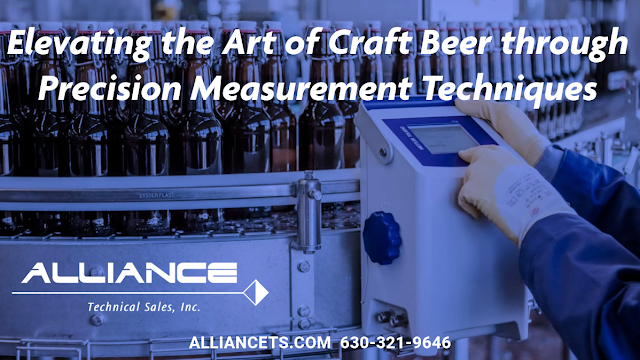An informative and educational resource specializing in process control instrumentation, analytical instruments, and related industrial equipment. Content includes technology basics, how-to's, new product developments, and application notes. Blog is courtesy of Alliance Technical Sales, a leading Manufacturers' Rep headquartered in Clarendon Hills, IL and serving customers in Illinois, Indiana, Iowa, Michigan and Wisconsin.
Merry Christmas and Happy New Year from Alliance Technical Sales
Optimize Your Process with Precision: Get Mettler-Toledo’s Comprehensive Guide to pH Measurement
Download the pH Theory Guide Here
312 Park Avenue Unit 145
Clarendon Hills, IL 60514-0145
Phone: 630-321-9646
https://alliancets.com
Optimizing Production Quality with Turbidity Meters
312 Park Avenue Unit 145
Clarendon Hills, IL 60514-0145
Phone: 630-321-9646
https://alliancets.com
The Future Role of Technical Sales Engineers in an AI-Driven World
AI in Process Instrumentation and Control
The Evolving Role of the Technical Sales Engineer
Complementing AI with Human Expertise
Why Customers Will Continue to Value Human Sales Engineers
A Future Built on Collaboration
312 Park Avenue Unit 145
Clarendon Hills, IL 60514-0145
Phone: 630-321-9646
https://alliancets.com
Beat the Winter Rush: The Smart Move is Planning Freeze Protection Now
312 Park Avenue Unit 145
Clarendon Hills, IL 60514-0145
Phone: 630-321-9646
https://alliancets.com
Mettler Toledo EasyClean 500: Precision Cleaning and Calibration, Effortlessly Automated
- Reduced Human Involvement: They minimize the need for manual maintenance, freeing up personnel for other tasks and reducing the risk of human error.
- Increased Maintenance Frequency: Automated systems enable more frequent cleaning and calibration cycles than manual methods, improving sensor accuracy and reliability over time.
- Enhanced Safety: By reducing the need for workers to access hazardous areas where sensors are often located, these systems enhance safety.
- Regulatory Compliance: They provide consistent, documented maintenance procedures that help companies meet regulatory requirements and quality standards.
Industrial Process Analytics: Enhancing Quality, Uniformity, and Safety through Instrumentation
Industrial Process Analytics is the systematic collection, analysis, and interpretation of data from various industrial processes. This field aims to optimize operations, enhance product quality, ensure uniformity, and maintain safety standards. Industries can measure critical parameters in real time by utilizing a range of process instrumentation, facilitating informed decision-making and continuous improvement.
Importance of Process Analytics Instrumentation
pH Measurement: Accurate pH measurement is vital for controlling chemical reactions and maintaining the chemical balance in processes. This ensures that responses occur under optimal conditions, which is crucial for product quality in pharmaceuticals, food processing, and wastewater treatment industries.
Dissolved Oxygen: Monitoring dissolved oxygen levels is essential for biological activity processes such as fermentation and wastewater treatment. It ensures optimal microbial activity, which impacts product quality and shelf life.
Conductivity: Conductivity measurements provide valuable information about the ionic content of solutions. This is vital for various industries' water treatment, chemical manufacturing, and quality control.
Turbidity: Turbidity measurement helps assess the clarity of liquids, essential for water treatment plants and beverage production, to ensure product clarity and purity.
Total Organic Carbon (TOC): TOC analyzers detect organic contaminants, aiding in monitoring water quality and ensuring compliance with environmental regulations. This is critical for pharmaceutical manufacturing, semiconductor production, and environmental monitoring.
Sodium and Silica: Measurements of sodium and silica are vital in power generation. These elements can cause scaling and corrosion in boilers and turbines, leading to inefficiencies and potential safety hazards.
Gas Analyzers: Gas analyzers provide real-time data on gas composition, which is essential for monitoring combustion efficiency, emissions control, and safety in industries like oil and gas, chemical manufacturing, and power generation.
Benefits of Process Analytics Instrumentation
Industries can improve quality by maintaining consistent product specifications and detecting deviations early by employing these process instruments. This leads to more excellent uniformity in production, reducing waste and increasing efficiency. Furthermore, real-time monitoring of critical parameters enhances safety by alerting operators to potentially hazardous conditions before they escalate.
Integration with Advanced Systems
Integrating Industrial Process Analytics with advanced control systems and data analytics platforms enables predictive maintenance, process optimization, and continuous improvement. This holistic approach not only improves current operations but also drives innovation and competitiveness in the long term.
Implementing process analytics instrumentation for these measurements allows industries to achieve a higher control over their processes. This leads to improved efficiency, reduced downtime, and enhanced product consistency and ultimately contributes to industrial operations' overall success and sustainability.
Industrial Process Analytics, supported by precise instrumentation, is crucial in optimizing industrial operations. Industries can ensure quality, uniformity, and safety by systematically monitoring and analyzing data, driving immediate improvements and long-term innovation.
312 Park Avenue Unit 145
Clarendon Hills, IL 60514-0145
Phone: 630-321-9646
https://alliancets.com
The Expertise Advantage: Why Knowledgeable Sales Engineering Matters
312 Park Avenue Unit 145
Clarendon Hills, IL 60514-0145
Phone: 630-321-9646
https://alliancets.com
Elevating the Art of Craft Beer through Precision Measurement Techniques
The craft beer industry has witnessed a remarkable rise in popularity, with discerning consumers seeking distinctive flavor profiles and superior quality. Craft breweries must prioritize consistency and excellence throughout the brewing process to satisfy these discerning palates. Integrating advanced measurement solutions for critical parameters such as pH, dissolved oxygen, gaseous oxygen, and turbidity is paramount to attaining optimal outcomes and preserving the intended taste characteristics of craft beers.
The Role of pH in Crafting Exceptional Beers:
The acidity or alkalinity of the brewing environment, quantified by pH, exerts a profound influence on the activity of enzymes, the well-being of yeast, and the ultimate flavor profile of the beer. Precise pH monitoring is indispensable for maintaining batch-to-batch uniformity. Cutting-edge pH meters with features like automatic temperature compensation and calibration functionality empower brewers to track and fine-tune pH levels closely throughout the brewing cycle. By diligently regulating pH within the ideal range, brewers can ward off undesirable flavors, guarantee efficient fermentation, and create beers that exemplify their intended taste attributes.
Dissolved Oxygen: A Critical Factor in Beer Quality:
The dissolved oxygen concentration (DO) in beer is a pivotal consideration, as it can significantly impact flavor stability and longevity. Excessive DO levels can trigger oxidation reactions, imparting stale or cardboard-like off-flavors to the beer. Cutting-edge DO meters employing optical sensing technology deliver precise and dependable measurements, empowering brewers to monitor and regulate vigilantly DO concentrations across the brewing and packaging stages. By minimizing the beer's exposure to DO, craft breweries can safeguard the freshness and integrity of their products.
Mitigating the Impact of Gaseous Oxygen:
Beyond dissolved oxygen, gaseous oxygen in the brewing environment warrants meticulous attention. Gaseous oxygen can infiltrate the beer during transfer processes, bottling, or canning, potentially leading to oxidative deterioration and compromised flavor. Advanced gaseous oxygen analyzers equip brewers to identify and quantify oxygen levels in the headspace of packaged beer. By diligently monitoring and controlling gaseous oxygen, craft breweries can effectively prevent oxidation and preserve the intended flavor characteristics of their beers.
Ensuring Beer Clarity through Turbidity Control:
Its turbidity or clarity greatly influences the visual allure and overall perception of craft beer. High-precision turbidity meters offer reliable and consistent measurements, enabling brewers to closely monitor the clarity of their beers at different junctures in the brewing process. By expertly manipulating turbidity levels, craft breweries can guarantee a consistent visual presentation and cater to consumer expectations, whether the desired outcome is a crystal-clear or intentionally hazy beer.
In conclusion, adopting state-of-the-art measurement solutions for pH, dissolved oxygen, gaseous oxygen, and turbidity is crucial for craft breweries aiming to elevate the quality and consistency of their offerings. Precise and reliable measurements arm brewers with the insights needed to make well-informed decisions, streamline their processes, and consistently deliver exceptional craft beers to their patrons. By strategically investing in cutting-edge measurement technologies, craft breweries can optimize their operations, minimize product inconsistencies, and cement their reputation as producers of top-tier, flavor-forward beers that stand out in the fiercely competitive craft beer landscape.
Alliance Technical Sales, Inc.312 Park Avenue Unit 145
Clarendon Hills, IL 60514-0145
Phone: 630-321-9646
https://alliancets.com
Ultrasonic Clamp-On Flowmeters: Revolutionizing Flow Measurement in Industrial and Commercial Applications
Innovative Measurement Technology
Value for Industries
312 Park Avenue Unit 145
Clarendon Hills, IL 60514-0145
Phone: 630-321-9646
https://alliancets.com










